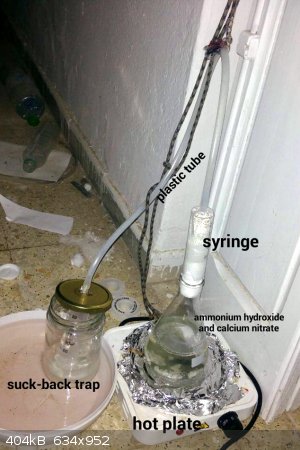Fluorite
Hazard to Others
  
Posts: 139
Registered: 26-12-2018
Location: United Arab Emirates
Member Is Offline
|
|
filtering ammonia gas
Hello
I did something really stupid two months ago, I mixed calcium hydroxide and ammonium nitrate to make ammonia gas and bubble it through deionized water
so I can make concentrated ammonia solution, well I messed up by adding loTS of water to the mixture and now I have a full 5L HDPE bottle with calcium
nitrate ammonium hydroxide and some sodium polysulfides 
I wanted to try again by bubbling carbon dioxide and precipitate CaCO3 to get my 3Kg ammonium nitrate again and concentrate it by boiling the water
but I nothing happened!
What can I do? now I wanna boil the solution to get my ammonia gas and filter it through cotton or idk so I can bubble pure ammonia but what can I use
to filter the gas? Is cotton perfect for removing ALL of the aerosols /mists/sprays?
Oh btw I got my ammonium nitrate by giving my friend my DSLR and he broke it so no I can't get more
|
|
|
BromicAcid
International Hazard
    
Posts: 3253
Registered: 13-7-2003
Location: Wisconsin
Member Is Offline
Mood: Rock n' Roll
|
|
How much carbon dioxide did you charge? It can sometimes be difficult to get into solution depending on the bubble size. You've got all the
hydroxide that you need to neutralize it's gonna take quite a bit (solubility in water though is a bit low so there is that). What is the pH of the
solution? Assuming polysulfides are form whatever fertilizer you procured one of the reagents from though it was not mentioned, is this a solid
residue, how much? You've made a concoction here, has it been open to the air or sealed? Your plan seems decent but not sure on your follow through.
|
|
|
macckone
Dispenser of practical lab wisdom
    
Posts: 2168
Registered: 1-3-2013
Location: Over a mile high
Member Is Offline
Mood: Electrical
|
|
bubbling carbon dioxide is less than optimal.
If you have an old coke or pepsi bottle, put the solution in and pressurize it with CO2.
|
|
|
Fery
International Hazard
    
Posts: 1026
Registered: 27-8-2019
Location: Czechoslovakia
Member Is Offline
|
|
I know CaCl2 forms a complex with ammonia, isn't it possible with Ca(NO3)2 too? Maybe increased T releases ammonia from the complex or is it not
enough so you were unable to obtain ammonia gas from your reaction mixture? Or was it caused only by excess of water?
I understand how cheap is technical CaO / Ca(OH)2 which could be bought in 25 kg packages in a shop specialized for building industry. But it
dissolves slowly. I would prefer NaOH, but this my advice is too late and it is somewhat out of topic, your actual goal is to recover NH4NO3. Maybe
for very large quantities of ammonia I would use CaO / Ca(OH)2 in the generator. Did anyone here try ammonia generator with CaO/Ca(OH)2 and with NaOH
so can compare these two ways and tell practical results instead of my theoretical thoughts?
|
|
|
Fluorite
Hazard to Others
  
Posts: 139
Registered: 26-12-2018
Location: United Arab Emirates
Member Is Offline
|
|
i guess ill buy a pressure cooker and boil the solution till dryness
does hydrogen sulfide stay or should i add CuSO4? i just want pure ammonia gas
|
|
|
Fluorite
Hazard to Others
  
Posts: 139
Registered: 26-12-2018
Location: United Arab Emirates
Member Is Offline
|
|
Can someone please tell me why tf when I bubble ammonia I get always a turbid solution!? I used a Polypropylene syringe as a suck-back trap and I'm
sure it's not the problem for the tube idk if it reacts with the ammonia

|
|
|
Fluorite
Hazard to Others
  
Posts: 139
Registered: 26-12-2018
Location: United Arab Emirates
Member Is Offline
|
|
Also! I added some NaOH to the calcium nitrate to remove any traces of Ammonium carbonate but the calcium hydroxide redissolve when I shake the flask!
Is Calcium hydroxide soluble in ammonia?
|
|
|
Fluorite
Hazard to Others
  
Posts: 139
Registered: 26-12-2018
Location: United Arab Emirates
Member Is Offline
|
|
I tried the same reaction again and used cotton to filter water vapors and ammonia but I still get a turbid solution! What material is this tube made
of? Because it's really cheap, and if it does react with ammonia to make a turbid solution does this hydrolyze to something like ethylene glycol?
Really hard to remove? Because when I filtered my concentrated ammonia through syringe with cotton I got pretty clear solution
|
|
|
Fyndium
International Hazard
    
Posts: 1192
Registered: 12-7-2020
Location: Not in USA
Member Is Offline
|
|
My cheapo transparent tubes are apparently made from PVC and the other one from polyurethane. At least the other one form an opaque white layer within
them when used with ammonia. This could produce something of this matter.
Actually I generated ammonia just a month ago and I used the new tubes which are PVC and they are unaffected by it. So it's PUR that is corroding with
ammonia. Apparently it also is not compatible with water, but fuel oils only.
EDIT3: Polyurethane does not seem to like nitrogen dioxide either. I vented it through one and it turned yellowish opaque and it stinks like hell. I
threw the tube away. PVC tube on the other hand has been holding very well against NO and NO2, even when wet, it's still like new after washing.
[Edited on 1-2-2021 by Fyndium]
|
|
|